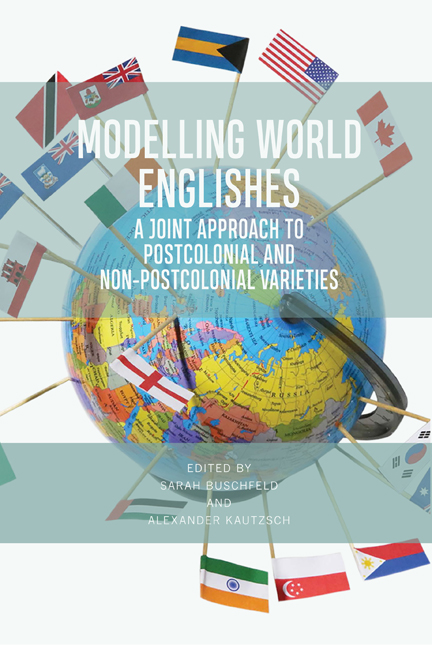Book contents
- Frontmatter
- Contents
- List of Figures and Tables
- List of Contributors
- Foreword
- 1 Introduction
- 2 English in England: The Parent Perspective
- 3 English in Namibia: Multilingualism and Ethnic Variation in the Extra- and Intra-territorial Forces Model
- 4 English in the United Arab Emirates: Status and Functions
- 5 English in India: Global Aspirations, Local Identities at the Grassroots
- 6 English in Singapore: Two Issues for the EIF Model
- 7 English in the Philippines: A Case of Rootedness and Routedness
- 8 English in South Korea: Applying the EIF Model
- 9 English in Japan: The Applicability of the EIF Model
- 10 English in Australia – Extra-territorial Influences
- 11 English in North America: Accounting for its Evolution
- 12 English in The Bahamas and Developmental Models of World Englishes: A Critical Analysis
- 13 Standard English in Trinidad: Multinormativity, Translocality, and Implications for the Dynamic Model and the EIF Model
- 14 Englishes in Tristan da Cunha, St Helena, Bermuda and the Falkland Islands: PCE, non-PCE or both? Blurred Boundaries in the Atlantic
- 15 English in Ireland: Intra-territorial Perspectives on Language Contact
- 16 English in Gibraltar: Applying the EIF Model to English in Non-Postcolonial Overseas Territories
- 17 English in Ghana: Extra- and Intra-territorial Forces in a Developmental Perspective
- 18 Synopsis: Fine-tuning the EIF Model
- Index
10 - English in Australia – Extra-territorial Influences
Published online by Cambridge University Press: 24 September 2020
- Frontmatter
- Contents
- List of Figures and Tables
- List of Contributors
- Foreword
- 1 Introduction
- 2 English in England: The Parent Perspective
- 3 English in Namibia: Multilingualism and Ethnic Variation in the Extra- and Intra-territorial Forces Model
- 4 English in the United Arab Emirates: Status and Functions
- 5 English in India: Global Aspirations, Local Identities at the Grassroots
- 6 English in Singapore: Two Issues for the EIF Model
- 7 English in the Philippines: A Case of Rootedness and Routedness
- 8 English in South Korea: Applying the EIF Model
- 9 English in Japan: The Applicability of the EIF Model
- 10 English in Australia – Extra-territorial Influences
- 11 English in North America: Accounting for its Evolution
- 12 English in The Bahamas and Developmental Models of World Englishes: A Critical Analysis
- 13 Standard English in Trinidad: Multinormativity, Translocality, and Implications for the Dynamic Model and the EIF Model
- 14 Englishes in Tristan da Cunha, St Helena, Bermuda and the Falkland Islands: PCE, non-PCE or both? Blurred Boundaries in the Atlantic
- 15 English in Ireland: Intra-territorial Perspectives on Language Contact
- 16 English in Gibraltar: Applying the EIF Model to English in Non-Postcolonial Overseas Territories
- 17 English in Ghana: Extra- and Intra-territorial Forces in a Developmental Perspective
- 18 Synopsis: Fine-tuning the EIF Model
- Index
Summary
INTRODUCTION
This chapter discusses the extra-territorial influence of American English (AmE) on Australian English (AusE), in comparison with other varieties within the spectrum of World Englishes. Its aim is to compare the different orientations to AmE in Australia that can be observed using qualitative and quantitative methods, and so to illuminate the different ways in which extra- and intra-territorial influences can impact on individual varieties.
Within the EIF Model, the range of varieties included within the World English paradigm is enlarged with those that have no Anglocolonial background (Buschfeld and Kautzsch 2017), and where English has no official or auxiliary status, and can only be typologised as ‘supplementary’ English (ESuppL), a language of convenience used for various reasons in multilingual contexts. New models of World English need to be capable of embracing ESuppL varieties alongside those in the established Inner/Outer/Expanding Circle Model (Kachru 1992). Recently identified external forces in the development of varieties – extra-territorial influences – include ‘transnational attraction’ (Schneider 2014), which operates independently of the languages in contact within any regional context. But whether the transnational attraction of AmE works in the same way for all speakers across the ENL/ESL/EFL/ESuppL spectrum should not be taken for granted. A further question to be explored is whether extra-territorial influence operates equally at all linguistic levels from phonology and orthography to lexical semantics.
Recent research on the extent to which English- and non-Englishspeaking countries are adopting AmE spellings and heteronyms over British English (BrE), is the subject of a major study by Goncalves et al. (2018). Its data consists of a corpus of more than 30 million tweets extracted from geolocated Twitter (2010–2016), and two massive corpora consisting of several billion words from Google English-language books published in the United Kingdom and the United States (1800–2010). The latter serves as a foil to the Twitter corpus in being edited works representing Standard English and showing trends and gradual changes in the norms over time. The Twitter corpus includes data from thirty countries including six where English is the native language, four where it is an official second or auxiliary language, and twenty where it has no official status but serves as a supplementary language. In all these contexts the transnational attraction of AmE in non-English-speaking countries can be seen and heard, and extra-territorial influence is evident but dispersed.
- Type
- Chapter
- Information
- Modelling World EnglishesA Joint Approach to Postcolonial and Non-Postcolonial Varieties, pp. 202 - 227Publisher: Edinburgh University PressPrint publication year: 2020



